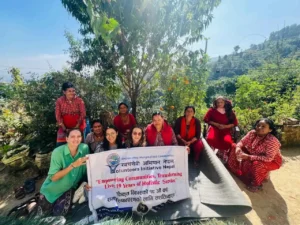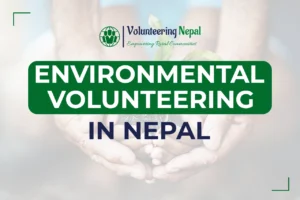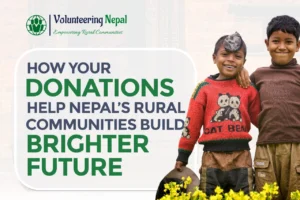
Down Syndrome Volunteer: Make a Real Difference in a Child’s Life
In Nepal, the mountains showcase the might and emotion of the nation’s people—for instance, the children Down Syndrome who tackle every new day with boundless joy and courage. When volunteering with us in our Down Syndrome program, you will not only provide assistance, but also build meaningful relationships that foster inclusivity and become an integral part of a child’s development.
This goes beyond volunteering; it is about building compassion and care that transforms lives.
Facts about Down Syndrome in Nepal
Only 10% of children with disabilities in Nepal attend school regularly due to a lack of accessible programs and trained staff.
That makes your decision to volunteer with Down syndrome children more than generous — it’s essential.
Local families are strong and resilient, but support systems are limited. When you participate in Down syndrome volunteer work, you become the connection between potential and progress.
Challenges that Down Syndrome is Facing
Volunteering isn’t about filling a gap. It’s about building a bridge — between cultures, between people, between possibility and action.
- Resource Limitations but Boundless Possibilities
- The support and educational frameworks in place for children with disabilities located in Nepal have room for improvement.
- Families are always devoted, but the available tools, training, and therapies do not meet most of their expectations.
- Special education teachers are non-existent, and clinical therapists are a precious gem.
However, the resolve of these people is remarkable.
What You Bring and Take Through This Volunteer Program

You don’t need a degree in special education to be impactful. You need patience. Playfulness. The ability to sit beside a child and be there.
International volunteers contribute:
- Language skills — speaking English with kids builds confidence
- Fresh ideas — games, songs, sensory tools
- Cultural exchange — you share your world, and they share theirs.
- Time — something these children rarely receive one-on-one
A Two-Way Exchange
You give your time. In return, Nepal offers you something less tangible — but far more lasting.
From cooking dal bhat with your host family to dancing in a schoolyard during Tihar, you’ll experience culture from the inside out. It’s not just volunteer work with Down Syndrome children. It’s immersion in the rhythm of life — colourful, imperfect, soulful.
What It’s Like to Volunteer with Down Syndrome Children
It isn’t a photo opportunity for your social media. It can be your once-in-a-lifetime experience. You’ll witness joy, frustration, and breakthroughs — sometimes all in the same hour.
Your Daily Flow
Each day might include:
- Helping children with fine motor skills: puzzles, crayons, threading beads
- Singing and storytelling in English
- Supporting classroom teachers
- Leading play-based therapy with toys, music, or movement
- Creating a bond with a single child who’s shy — and watching them open up.
- Assist with lunch, clean-up, or classroom transitions
- Working during monthly activities, festivals, or community days
One day, a child might grab your hand and not let go. Otherwise, they might ignore you completely. And then suddenly — they speak a word. Look you in the eyes. Smile. You’ll never forget that moment.
🤔 Down Syndrome Myth Buster Quiz
Test your knowledge — true or false? Click to reveal the truth!
💡 Knowledge reduces stigma — thanks for playing!
Where You’ll Be
Most placements are based in Kathmandu Valley, a blend of ancient temples, bustling markets, and quiet neighborhood lanes. Volunteers may also choose rural villages — where the pace slows and the connections deepen.
Expect:
- Short morning commutes by foot or rickshaw
- Mountains on the horizon, prayer flags overhead
- Warm greetings from neighbours
- Shared evening meals with your host family
Emotional Rewards
You’ll cry. You’ll laugh. You’ll question your impact — and then realize it’s working.
There is no better reminder of what it means to be human than sitting beside a child, helping them feel seen in a world that too often looks away.
Long-Term Impact of Volunteering with Down Syndrome Children

When you participate in Down Syndrome volunteer work in Nepal, your influence doesn’t end when you pack your bags. That’s where it often begins.
Your time, presence, and care leave lasting ripples in a child’s development and the community’s understanding of inclusion. Teachers adopt the new play-based methods you introduced. Families, recall your patience and replicate it. Children remember your encouragement — and build confidence from it.
Over the years, Volunteers Nepal has tracked progress in centres where volunteers have helped create structured daily routines. In several schools, kids previously withdrew and began engaging in music or social play thanks to regular exposure to international volunteers. One school even developed its own “inclusive day” after a group of volunteers hosted a cultural awareness session — proof that volunteer work with Down syndrome doesn’t just help individuals; it changes systems.
Your contribution becomes part of the child’s story — long after you return home.
Who Should Join the Down Syndrome Volunteer Program?
Our Down syndrome volunteer opportunities are open to everyone. Whether you’re a student on a break, a working professional seeking purpose, or a retiree ready to give back — your unique skills can make a real difference.
Ideal Candidates Include:
- Gap-year students seeking meaningful travel
- University students in psychology, education, or child development
- Healthcare professionals interested in inclusive care
- Parents who understand the patience children need
- Travelers with a heart for service and cultural immersion
- Retirees who want to spend time giving rather than sightseeing
- Digital nomads looking for flexible ways to volunteer.
Even if you’re searching “volunteer with Down syndrome near me” and you’ve never traveled internationally before — this program gives you guidance, structure, and support every step of the way.
About Volunteering Nepal’s Disability Program
Volunteering Nepal isn’t an agency. It’s a community. A collective of local educators, caregivers, host families, and volunteers united by one goal — creating meaningful change through presence and compassion.

What Volunteering Nepal Does
- Matches international volunteers with inclusive schools and centres
- Hosts disability awareness workshops and public events
- Support family programs for parents and caregivers
- Organizes music, art, and festival-themed sessions with children
- Collaborate with local teachers to create sustainable routines
- Coordinates quarterly activities and weekend excursions for deeper immersion
How can you help through the Volunteering Nepal Organization?
Your contribution might look like:
- Leading a fun activity like finger painting or musical games
- Helping organize an upcoming event for Disability Day
- Designing basic visual aids or routine charts
- Sitting with one child daily for social development
- Participating in community events to spread public awareness
And sometimes? Just being present. Sitting next to a child and sharing a smile — because some gestures are universal.
Down Syndrome Volunteer Program Details
Whether you stay for two weeks or six months, you become part of a wider story — one written in joy, struggle, laughter, and light.
| Program Element | Details |
| Duration | Flexible: 1–24 weeks |
| Location | Kathmandu & nearby villages |
| Accommodation | Homestay or shared volunteer guesthouse |
| Meals | 2–3 home-cooked Nepali meals per day |
| Volunteer Type | Solo, friends, partners, or small groups (up to 3 people) |
| Support Provided | Orientation, 24/7 support, emergency contact, cultural tips |
| Extra Options | Weekend treks, Nepali language lessons, festival volunteering |
You don’t need to be a specialist. You need to take care.
A Journey in Their Words
Muriele Haroutian: “Mon expérience a été une réelle expérience de richesse humaine. J’ai rencontré des femmes formidables et en premier, la responsable du programme, OM, qui fait preuve d’une grande humanité. Je n’avais aucune ambition en arrivant car je respecte avant tout les usages et coutumes du pays accueillant. J’ai démarré par une activité universelle, la couture et la confection de sacoches, sous forme d’un atelier, avec l’objectif économique à terme de vendre, en fonction des motivations, des compétences et de la disponibilité des participantes. Finalement, nous avons monté un projet social et économique, vendu les sacs, nous avons créé une page facebook pour promouvoir les produits et j’espère que le projet continuera à fonctionner après mon départ.“
Justine Gens: “It has been a life changing experience. I have found myself very comfortable in the adaptation with the local culture as everyone is trying their best to make you feel good. It has been a very different type of social work that I will keep in mind forever for my future work.”
Natalia Dos Santos: “To be a VIN volunteer is a mixed of feelings. The most time we are happy because everyday there are new things to know. And Nepal really needs our empathy, skills and time. So to know the culture before arriving here is very important. To be a volunteer in Nepal will change the perspective of your life.“
These are not travel stories. These are life stories — and you could write the next one.
🧭 Volunteer Personality Matcher
Answer 5 quick questions to discover your perfect volunteering role!
Cultural Immersion & Local Life
This program isn’t just about volunteering — it’s about living Nepali life from within.
What You’ll Experience
- Sharing meals with a local family (learn how to eat rice with your hands!)
- Attending local festivals like Holi, Dashain, or Tihar
- Visiting ancient heritage sites on weekends
- Walking through traditional villages with kids waving hello
- Learning Nepali greetings and customs
- Shopping in local markets — not tourist zones
This is where travel becomes a transformation.
Before You Go
Here are a few things to keep in mind:
- Vaccinations: Consult your doctor about standard travel shots
- Clothing: Dress modestly — long pants and covered shoulders
- Language: English is standard, but learning a few Nepali phrases goes a long way
- Mindset: Come with openness, flexibility, and a sense of humour
- Support: You’ll never be alone — we have guides and coordinators to help at every step
FAQs
What specific training or qualifications are required for volunteers?
No specific training is required. Volunteers should bring compassion, patience, and a willingness to engage.
Orientation and basic guidance are provided on arrival, covering disability etiquette, classroom roles, and cultural expectations.
How does the selection process work for volunteers interested in the program?
Volunteers fill out an online application detailing their interests, availability, and any relevant experience.
The Volunteering Nepal team reviews applications, conducts a short virtual interview if needed, and matches candidates with the most suitable placement based on their background and preferences.
What types of activities and events do volunteers participate in during their spare time outside of their volunteer responsibilities?
Volunteers often join cultural festivals (like Dashain, Tihar, or Holi), take weekend treks, attend cooking classes, visit UNESCO sites like Boudhanath and Bhaktapur, or enjoy meditation at Buddhist monasteries. Social dinners, language exchange meetups, and traditional art workshops are also popular.
Final Invitation
Every child with Down Syndrome has something beautiful to give. And so do you.
It is more than a trip. More than volunteer work.
It’s a chance to connect. To be part of something larger than yourself.
Join the Down Syndrome volunteer program in Nepal today — and become the reason someone smiles tomorrow.



